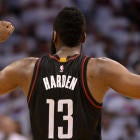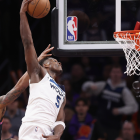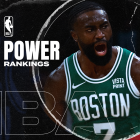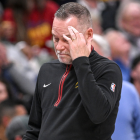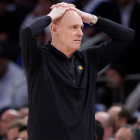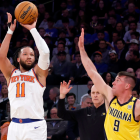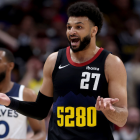The Houston Rockets aren't playing their best basketball against the Oklahoma City Thunder, and that might be the most impressive thing you can say about them. With a 113-109 win on Sunday, the Rockets took a 3-1 lead in the series and once again showed that they can persevere in difficult situations. This time, Houston needed a 40-point third quarter to escape Oklahoma City with a victory.
The Rockets blew out the Thunder 118-87 in Game 1. The three games since then have been decided by four, two and four points, respectively. Oklahoma City has won every first quarter, and it has built a lead of at least 14 points in each of them. When Houston has started slowly, or seen the Thunder go on a run, it has kept its composure and trusted its system.
"How they fought, it was incredible," Rockets coach Mike D'Antoni said. "It wasn't pretty. We did put 40 points up in the fourth quarter, but it was all by guts. It was just playing hard and playing playoff basketball. We finally got into it the way you gotta get into it, and hopefully it'll carry over to the next game."
The conventional wisdom about the Rockets is that they go how James Harden goes. In D'Antoni's spread pick-and-roll offense, he is the man with the ball in his hands on the vast majority of their possessions, and he deserves credit for helping several of his teammates have career seasons. In Game 4, though, Harden finally went cold -- after scoring 116 points in the first three games, he had 16 points on 5-for-16 shooting, including 0-for-7 from 3-point range, plus seven turnovers. Despite this, and despite Oklahoma City consistently getting out on the break after turnovers and misses, Houston prevailed. How?
The truth about the Rockets is that they are not a one-man team. They have been constructed in such a way that Harden doesn't need to go off every night -- he just usually does. When he's missing, he still makes his teammates better. Opposing teams still tell their best wing defender to stay as close to him as possible and send help when he runs a pick-and-roll or gets in the paint. Unlike the Thunder, Houston has an embarrassment of riches when it comes to playmaking: Patrick Beverley in the starting lineup, plus Lou Williams and Eric Gordon on the bench.
Williams and Gordon had 18 points apiece, but the hero as the Rockets took control of the series was Nene. The backup center shot a perfect 12-for-12 and scored a team-high 28 points, combining smooth finishes off passes from Harden with deft post moves against OKC's big bodies.
"He was unbelievable in all facets," D'Antoni said.
Much has been made of Houston's unique approach. In a league full of superteams, the front office found itself with only one superstar. It chose to surround him with a coaching staff and supporting cast that benefit from and accentuate that superstar's specific strengths. Rockets general manager Daryl Morey said in February that their plan to challenge the Golden State Warriors is to hit them with "a barrage of 3-pointers," and, in theory, this makes a lot of sense. If you can't necessarily match a team's talent, then one way to keep up with them is to launch a ton of 3s and hope that most of them go in.
This strategy is not only helpful when dealing with a team like the Warriors, though. It is how Houston plays all the time, and it gives the team more room for error. Everything about the Rockets' offense is predicated on the fact that they can hit a few 3s in a row at any time, and if you try to take those shots away, you'll almost certainly surrender layups or send Harden to the free-throw line repeatedly. Even when Oklahoma City is using its physicality and athleticism to its advantage, these guys genuinely believe no deficit is too large to overcome.
So far, they have been right more often than not.













